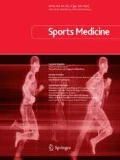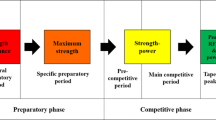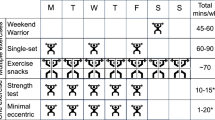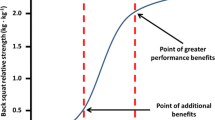Abstract
Background
Effects of resistance training on muscle strength and hypertrophy are well established in adults and younger elderly. However, less is currently known about these effects in the very elderly (i.e., 75 years of age and older).
Objective
To examine the effects of resistance training on muscle size and strength in very elderly individuals.
Methods
Randomized controlled studies that explored the effects of resistance training in very elderly on muscle strength, handgrip strength, whole-muscle hypertrophy, and/or muscle fiber hypertrophy were included in the review. Meta-analyses of effect sizes (ESs) were used to analyze the data.
Results
Twenty-two studies were included in the review. The meta-analysis found a significant effect of resistance training on muscle strength in the very elderly [difference in ES = 0.97; 95% confidence interval (CI) 0.50, 1.44; p = 0.001]. In a subgroup analysis that included only the oldest-old participants (80 + years of age), there was a significant effect of resistance training on muscle strength (difference in ES = 1.28; 95% CI 0.28, 2.29; p = 0.020). For handgrip strength, we found no significant difference between resistance training and control groups (difference in ES = 0.26; 95% CI − 0.02, 0.54; p = 0.064). For whole-muscle hypertrophy, there was a significant effect of resistance training in the very elderly (difference in ES = 0 30; 95% CI 0.10, 0.50; p = 0.013). We found no significant difference in muscle fiber hypertrophy between resistance training and control groups (difference in ES = 0.33; 95% CI − 0.67, 1.33; p = 0.266). There were minimal reports of adverse events associated with the training programs in the included studies.
Conclusions
We found that very elderly can increase muscle strength and muscle size by participating in resistance training programs. Resistance training was found to be an effective way to improve muscle strength even among the oldest-old.






Similar content being viewed by others
References
Clark BC, Manini TM. What is dynapenia? Nutrition. 2012;28:495–503.
Visser M, Deeg DJ, Lips P, et al. Skeletal muscle mass and muscle strength in relation to lower-extremity performance in older men and women. J Am Geriatr Soc. 2000;48:381–6.
Newman AB, Kupelian V, Visser M, et al. Strength, but not muscle mass, is associated with mortality in the health, aging and body composition study cohort. J Gerontol A Biol Sci Med Sci. 2006;61:72–7.
Clark BC, Manini TM. Functional consequences of sarcopenia and dynapenia in the elderly. Curr Opin Clin Nutr Metab Care. 2010;13:271–6.
Cruz-Jentoft AJ, Bahat G, Bauer J, et al. Sarcopenia: revised European consensus on definition and diagnosis. Age Ageing. 2019;48:16–311.
Faigenbaum AD, Kraemer WJ, Blimkie CJ, et al. Youth resistance training: updated position statement paper from the national strength and conditioning association. J Strength Cond Res. 2009;23:S60–79.
Liu CJ, Latham NK. Progressive resistance strength training for improving physical function in older adults. Cochrane Database Syst Rev. 2009;3:002759.
American College of Sports Medicine. American College of Sports Medicine position stand. Progression models in resistance training for healthy adults. Med Sci Sports Exerc. 2009;41:687–708.
Fragala MS, Cadore EL, Dorgo S, et al. Resistance training for older adults: position statement from the National Strength and Conditioning Association. J Strength Cond Res. 2019;33:2019–52.
Ouchi Y, Rakugi H, Arai H, et al. Redefining the elderly as aged 75 years and older: proposal from the Joint Committee of Japan Gerontological Society and the Japan Geriatrics Society. Geriatr Gerontol Int. 2017;17:1045–7.
Stewart VH, Saunders DH, Greig CA. Responsiveness of muscle size and strength to physical training in very elderly people: a systematic review. Scand J Med Sci Sports. 2014;24:e1–.
Phillips SM. A brief review of critical processes in exercise-induced muscular hypertrophy. Sports Med. 2014;44:71–7.
Burd NA, Gorissen SH, van Loon LJ. Anabolic resistance of muscle protein synthesis with aging. Exerc Sport Sci Rev. 2013;41:169–73.
Petrella JK, Kim JS, Mayhew DL, et al. Potent myofiber hypertrophy during resistance training in humans is associated with satellite cell-mediated myonuclear addition: a cluster analysis. J Appl Physiol. 2008;104:1736–42.
Petrella JK, Kim JS, Cross JM, et al. Efficacy of myonuclear addition may explain differential myofiber growth among resistance-trained young and older men and women. Am J Physiol Endocrinol Metab. 2006;291:E937–E946946.
Karlsen A, Bechshøft RL, Malmgaard-Clausen NM, et al. Lack of muscle fibre hypertrophy, myonuclear addition, and satellite cell pool expansion with resistance training in 83–94-year-old men and women. Acta Physiol (Oxf). 2019;227:e13271.
Lundberg TR, Gustafsson T. Fibre hypertrophy, satellite cell and myonuclear adaptations to resistance training: have very old individuals reached the ceiling for muscle fibre plasticity? Acta Physiol. 2019;227:e13287.
Doherty TJ, Vandervoort AA, Brown WF. Effects of ageing on the motor unit: a brief review. Can J Appl Physiol. 1993;18:331–58.
Doherty TJ, Vandervoort AA, Taylor AW, et al. Effects of motor unit losses on strength in older men and women. J Appl Physiol. 1993;74:868–74.
Fiatarone MA, Marks EC, Ryan ND, et al. High-intensity strength training in nonagenarians. Effects on skeletal muscle. JAMA. 1990;263:3029–34.
Bruunsgaard H, Bjerregaard E, Schroll M, et al. Muscle strength after resistance training is inversely correlated with baseline levels of soluble tumor necrosis factor receptors in the oldest old. J Am Geriatr Soc. 2004;52:237–41.
Caserotti P, Aagaard P, Larsen JB, et al. Explosive heavy-resistance training in old and very old adults: changes in rapid muscle force, strength and power. Scand J Med Sci Sports. 2008;18:773–82.
Giné-Garriga M, Guerra M, Pagès E, et al. The effect of functional circuit training on physical frailty in frail older adults: a randomized controlled trial. J Aging Phys Act. 2010;18:401–24.
Hruda KV, Hicks AL, McCartney N. Training for muscle power in older adults: effects on functional abilities. Can J Appl Physiol. 2003;28:178–89.
Judge JO, Whipple RH, Wolfson LI. Effects of resistive and balance exercises on isokinetic strength in older persons. J Am Geriatr Soc. 1994;42:937–46.
Kalapotharakos VI, Diamantopoulos K, Tokmakidis SP. Effects of resistance training and detraining on muscle strength and functional performance of older adults aged 80 to 88 years. Aging Clin Exp Res. 2010;22:134–40.
Kim HK, Suzuki T, Saito K, et al. Effects of exercise and amino acid supplementation on body composition and physical function in community-dwelling elderly Japanese sarcopenic women: a randomized controlled trial. J Am Geriatr Soc. 2012;60:16–23.
Serra-Rexach JA, Bustamante-Ara N, Hierro Villarán M, et al. Short-term, light- to moderate-intensity exercise training improves leg muscle strength in the oldest old: a randomized controlled trial. J Am Geriatr Soc. 2011;59:594–602.
Skelton DA, Young A, Greig CA, et al. Effects of resistance training on strength, power, and selected functional abilities of women aged 75 and older. J Am Geriatr Soc. 1995;43:1081–7.
Bechshøft RL, Malmgaard-Clausen NM, Gliese B, et al. Improved skeletal muscle mass and strength after heavy strength training in very old individuals. Exp Gerontol. 2017;92:96–105.
Benavent-Caballer V, Rosado-Calatayud P, Segura-Ortí E, et al. Effects of three different low-intensity exercise interventions on physical performance, muscle CSA and activities of daily living: a randomized controlled trial. Exp Gerontol. 2014;58:159–65.
Cadore EL, Casas-Herrero A, Zambom-Ferraresi F, et al. Multicomponent exercises including muscle power training enhance muscle mass, power output, and functional outcomes in institutionalized frail nonagenarians. Age (Dordr). 2014;36:773–85.
Kim H, Suzuki T, Kim M, et al. Effects of exercise and milk fat globule membrane (MFGM) supplementation on body composition, physical function, and hematological parameters in community-dwelling frail Japanese women: a randomized double blind, placebo-controlled, follow-up trial. PLoS ONE. 2015;10:e0116256.
Sahin UK, Kirdi N, Bozoglu E, et al. Effect of low-intensity versus high-intensity resistance training on the functioning of the institutionalized frail elderly. Int J Rehabil Res. 2018;41:211–7.
Christensen K, Doblhammer G, Rau R, et al. Ageing populations: the challenges ahead. Lancet. 2009;374:1196–208.
National Center for Health Statistics. Survey description, national health interview survey, 2015. Hyattsville: National Center for Health Statistics; 2016.
Moher D, Liberati A, Tetzlaff J, et al. Preferred reporting items for systematic reviews and meta-analyses: the PRISMA statement. Ann Intern Med. 2009;151:264–9.
Fielding RA. The role of progressive resistance training and nutrition in the preservation of lean body mass in the elderly. J Am Coll Nutr. 1995;14:587–94.
Guizelini PC, de Aguiar RA, Denadai BS, et al. Effect of resistance training on muscle strength and rate of force development in healthy older adults: a systematic review and meta-analysis. Exp Gerontol. 2018;102:51–8.
Liberman K, Forti LN, Beyer I, et al. The effects of exercise on muscle strength, body composition, physical functioning and the inflammatory profile of older adults: a systematic review. Curr Opin Clin Nutr Metab Care. 2017;20:30–533.
Porter MM. High-intensity strength training for the older adult—a review. Top Geriatr Rehabil. 1995;10:61–74.
Steib S, Schoene D, Pfeifer K. Dose-response relationship of resistance training in older adults: a meta-analysis. Med Sci Sports Exerc. 2010;42:902–14.
Straight CR, Lindheimer JB, Brady AO, et al. Effects of resistance training on lower-extremity muscle power in middle-aged and older adults: a systematic review and meta-analysis of randomized controlled trials. Sports Med. 2016;46:353–64.
Downs SH, Black N. The feasibility of creating a checklist for the assessment of the methodological quality both of randomised and non-randomised studies of health care interventions. J Epidemiol Community Health. 1998;52:377–84.
Grgic J, Schoenfeld BJ, Davies TB, et al. Effect of resistance training frequency on gains in muscular strength: a systematic review and meta-analysis. Sports Med. 2018;48:1207–20.
Grgic J, Schoenfeld BJ, Skrepnik M, et al. Effects of rest interval duration in resistance training on measures of muscular strength: a systematic review. Sports Med. 2018;48:137–51.
Morris B. Estimating effect sizes from pretest–posttest-control group designs. Organ Res Methods. 2008;11:364–86.
Tanner-Smith EE, Tipton E, Polanin JR. Handling complex meta-analytic data structures using robust variance estimates: a tutorial in R. J Dev Life Course Criminol. 2016;2:85–112.
Sasaki H, Kasagi F, Yamada M, et al. Grip strength predicts cause-specific mortality in middle-aged and elderly persons. Am J Med. 2007;120:337–42.
Fisher Z, Tipton E, Zhipeng H. robumeta: robust variance meta-regression. R package version 2.0. 2017. https://www.CRAN.R-project.org/package=robumeta. Accessed 1 Feb 2020.
Viechtbauer W. Conducting meta-analyses in R with the metafor package. J Stat Softw. 2010;36:1–48.
Fiatarone MA, O'Neill EF, Ryan ND, et al. Exercise training and nutritional supplementation for physical frailty in very elderly people. N Engl J Med. 1994;330:1769–75.
Fiatarone Singh MA, Ding W, Manfredi TJ, et al. Insulin-like growth factor I in skeletal muscle after weight-lifting exercise in frail elders. Am J Physiol. 1999;277:E135–E143143.
Sipilä S, Suominen H. Effects of strength and endurance training on thigh and leg muscle mass and composition in elderly women. J Appl Physiol. 1995;78:334–40.
Sipilä S, Multanen J, Kallinen M, et al. Effects of strength and endurance training on isometric muscle strength and walking speed in elderly women. Acta Physiol Scand. 1996;156:457–64.
Sipilä S, Elorinne M, Alen M, et al. Effects of strength and endurance training on muscle fibre characteristics in elderly women. Clin Physiol. 1997;17:459–74.
Hvid LG, Strotmeyer ES, Skjødt M, et al. Voluntary muscle activation improves with power training and is associated with changes in gait speed in mobility-limited older adults—a randomized controlled trial. Exp Gerontol. 2016;80:51–6.
Kim H, Suzuki T, Saito K, et al. Effects of exercise and tea catechins on muscle mass, strength and walking ability in community-dwelling elderly Japanese sarcopenic women: a randomized controlled trial. Geriatr Gerontol Int. 2013;13:458–65.
Xue QL, Beamer BA, Chaves PH, et al. Heterogeneity in rate of decline in grip, hip, and knee strength and the risk of all-cause mortality: the women’s health and aging study II. J Am Geriatr Soc. 2010;58:2076–84.
Mitchell WK, Williams J, Atherton P, et al. Sarcopenia, dynapenia, and the impact of advancing age on human skeletal muscle size and strength; a quantitative review. Front Physiol. 2012;3:260.
Goodpaster BH, Park SW, Harris TB, et al. The loss of skeletal muscle strength, mass, and quality in older adults: the health, aging and body composition study. J Gerontol A Biol Sci Med Sci. 2006;61:1059–64.
Delmonico MJ, Harris TB, Visser M, et al. Longitudinal study of muscle strength, quality, and adipose tissue infiltration. Am J Clin Nutr. 2009;90:1579–85.
Moreland JD, Richardson JA, Goldsmith CH, et al. Muscle weakness and falls in older adults: a systematic review and meta-analysis. J Am Geriatr Soc. 2004;52:1121–9.
Cronin J, Lawton T, Harris N, et al. A brief review of handgrip strength and sport performance. J Strength Cond Res. 2017;31:3187–217.
Saric J, Lisica D, Orlic I, et al. Resistance training frequencies of 3 and 6 times per week produce similar muscular adaptations in resistance-trained men. J Strength Cond Res. 2019;33:S122–S129129.
Sale D, MacDougall D. Specificity in strength training: a review for the coach and athlete. Can J Appl Sport Sci. 1981;6:87–92.
Tieland M, Verdijk LB, de Groot LC, et al. Handgrip strength does not represent an appropriate measure to evaluate changes in muscle strength during an exercise intervention program in frail older people. Int J Sport Nutr Exerc Metab. 2015;25:27–36.
Buckner SL, Dankel SJ, Bell ZW, Abe T, Loenneke JP. The association of handgrip strength and mortality: what does it tell us and what can we do with it? Rejuvenation Res. 2019;22:230–4.
Baumgartner RN, Koehler KM, Gallagher D, et al. Epidemiology of sarcopenia among the elderly in New Mexico. Am J Epidemiol. 1998;147:755–63.
Wilson W, Breen L, Lord JM, et al. The challenges of muscle biopsy in a community based geriatric population. BMC Res Notes. 2018;11:830.
Burton E, Farrier K, Lewin G, et al. Motivators and barriers for older people participating in resistance training: a systematic review. J Aging Phys Act. 2017;25:311–24.
Gentil P, Bottaro M. Effects of training attendance on muscle strength of young men after 11 weeks of resistance training. Asian J Sports Med. 2013;4:101–6.
Buckner SL, Jessee MB, Mattocks KT, et al. Determining strength: a case for multiple methods of measurement. Sports Med. 2017;47:193–5.
Schoenfeld BJ, Grgic J, Ogborn D, et al. Strength and hypertrophy adaptations between low- vs. high-load resistance training: a systematic review and meta-analysis. J Strength Cond Res. 2017;31:3508–23.
Author information
Authors and Affiliations
Corresponding author
Ethics declarations
Funding
No sources of funding were used to assist in the preparation of this article.
Conflict of interest
Jozo Grgic, Alessandro Garofolini, John Orazem, Filip Sabol, Brad J. Schoenfeld and Zeljko Pedisic have no conflicts of interest that are directly relevant to the content of this article.
Ethics approval
Not applicable.
Consent to participate
Not applicable.
Consent for publication
Not applicable.
Availability of data and material
The datasets generated and analyzed during the current systematic review and meta-analysis are available from the corresponding author on reasonable request.
Code availability
Not applicable.
Author Contributions
JG conceived the idea for the review. JG and AG conducted the study selection quality assessment. JG and FS conducted the data extraction. JO performed the statistical analysis. JG drafted the initial manuscript. All authors contributed to data interpretation, writing of the manuscript, and its revisions.
Rights and permissions
About this article
Cite this article
Grgic, J., Garofolini, A., Orazem, J. et al. Effects of Resistance Training on Muscle Size and Strength in Very Elderly Adults: A Systematic Review and Meta-Analysis of Randomized Controlled Trials. Sports Med 50, 1983–1999 (2020). https://doi.org/10.1007/s40279-020-01331-7
Published:
Issue Date:
DOI: https://doi.org/10.1007/s40279-020-01331-7




